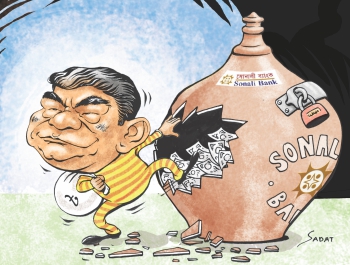HALLMARK SCAM
Cracks in management and monitoring systems of banks
SALEHUDDIN AHMED
 |
|
For the last few days we have been witnessing a furore caused by Tk.3,547 crore loan scam in a branch of the Sonali Bank where a little-known company named Hallmark had alone siphoned off Tk.2,500 crore. This is unprecedented in the history of our banking sector because the borrower is neither a well-known nor a well-established company. It is in the air that this huge amount of money has been given to the company by Sonali Bank, Ruposhi Bangla branch, in completely irregular way which has been misused by the company. This is alarming news for our banking as well as the financial sector as a whole.
Usually, banks collect money from depositors and provide loan to business entities and other borrowers. After this huge Sonali Bank scam common people might lose their trust in the banks. They will not find it secure to keep their money in the banks. Many of them may even be tempted to withdraw their deposits in fear of a collapse of the banking sector like the share market collapse. If common people shy away from the banks this may cause shortfall of money in our banking sector as well as other financial sectors like investment, trade and commerce. If people withdraw money from banks then entrepreneurs would not get money from banks to invest in productive sectors. Since banks are very important institutions in financial intermediation in economic activities, the lack of trust in banks has a pervasive effect on the whole economy.
Now, let us see as to how a scam of this magnitude could be possible. I think this has been possible because of weakness in the management of the bank, weakness in internal oversight and control and, most of all, due to collusion of some insiders in the bank and outsiders. I see the situation also reflects the lack of governance and overall control of the Banks Board of Directors, because they should have exercised their supervision and control over such a huge amount of loan. Usually, banks conduct audit of a branch once a year, sometimes twice. So here it is important to look into how the Board of Directors as well as the management led by the managing director supervised the process of providing such a huge amount to a single company.
Generally, the monitoring and control by the bank's Board of Directors and its Audit Committee and the Asset Liability Management Committee (ALCO) are imperative in such a big transaction. If proper audit had been conducted in this case why did the management (managing director and the staff below that) and the Board of Directors not examine the audit report? And if they did, then why had they not expressed their opinion or take action against the perpetrators? If audit reports were not placed before the Board, why the Board did not take action at the right time? This is an instance of an amazing combination of abject lack of supervision, control, unwillingness to take action, failure of policy direction, greed, forgery and corruption.
Bangladesh Bank has recommended reconstituting the Board of the Sonali Bank. As a former governor of the Bangladesh Bank I welcome this step. On the other hand, I do not think that the finance minister's initial comment on Bangladesh Bank's authority to recommend the change is justified. Though, later, he accepted Bangladesh Bank's step, but we are yet to see quick and firm action from the government. According to the Articles 45 and 46 of the Bank Company Act, Bangladesh Bank is well within its rights to make such recommendation. But in a sub-clause of Article 46 this power has been curtailed in the case of the state owned banks. This is not good for regulating and supervising the banks by the central bank. I think that this law should be changed to remove the limitation of the central bank. Then the central bank would be fully responsible for the monitoring, control and discipline of all the banks.
People who have experiences in finance, economics, management of financial institutions and people who are not involved directly in politics, not loan defaulters, and people with honesty and integrity, should be nominated to the Boards of all the state owned banks as well as in the private banks. In some cases directors are appointed under political consideration disregarding these requirements. Due to such political appointments such scams may occur in the future too. However, this scam should be investigated immediately and the culprits should be brought to book. Suspension of officials from their jobs and dissolution of the Board will not be enough for the perpetrators; they should be given exemplary punishment so that no one will dare to do it again in the future. In many countries exemplary punishment was given to the perpetrators, even the accused politicians were not spared.
The regular audit teams, special audit teams, and supervision teams of all the government, non-government and specialised banks should be trained to be better skilled. Banks should hire independent external auditors to get better insights into the state of affairs of all the banks in Bangladesh. We have to carry out these steps at the earliest possible time so that perpetrators cannot escape and others can learn a lesson. The control and monitoring system of the Bangladesh Bank should be further strengthened and coordinated, and timely action without fear of any political and external influence should be taken. The Ministry of Finance, specifically the Banking Division, must take proper action immediately in tandem with the actions of the Bangladesh Bank. If these measures are taken at the earliest possible time the banking sector could be protected from any future disaster.
...............................................................................................................................
The writer is a former Governor, Bangladesh Bank.
This article first appeared on September 4, 2012 in The Daily Star.